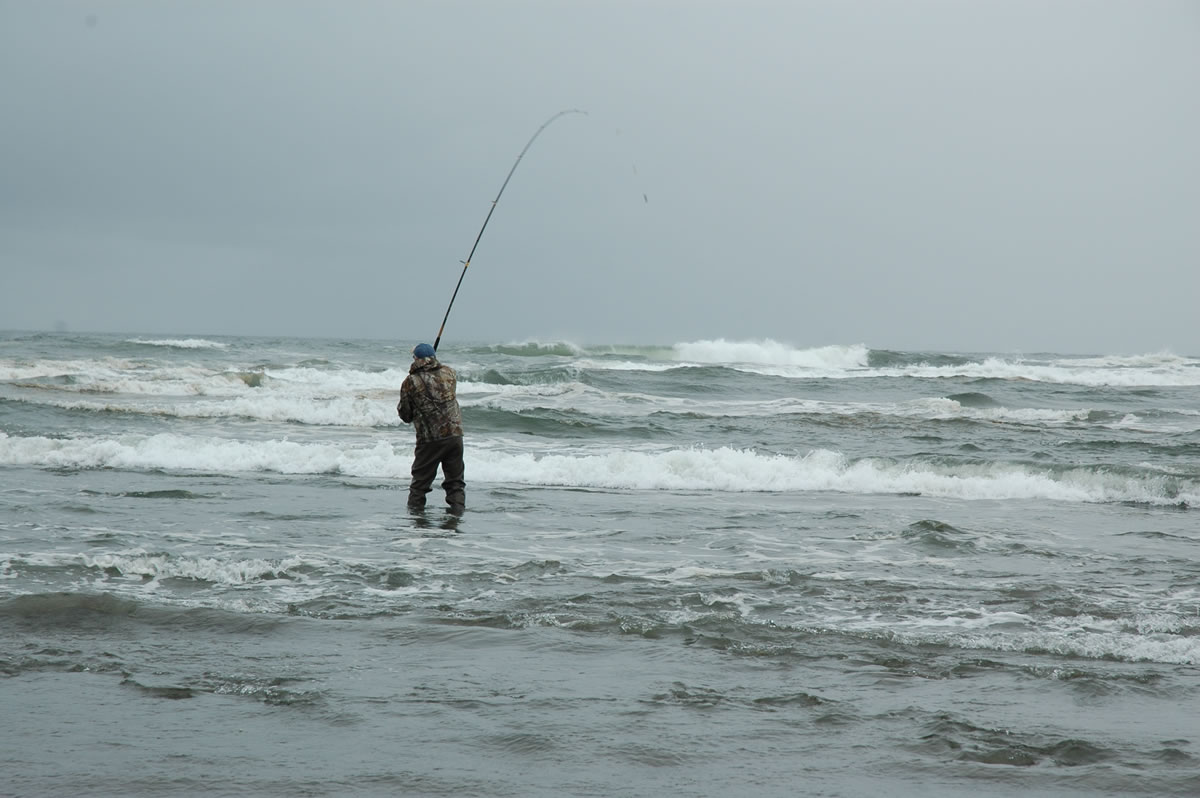LONG BEACH — It was windy, raining intermittently, and the tide was ebbing — conditions not conducive to good fishing for redtail surf perch along the Washington coast.
But the conditions did not stop Rick Weir of Ocean Park from catching 21 pounds of surf perch in his 12-fish limit in the annual Long Beach Lions Club Surf Perch Derby on Saturday.
SEASON: Angling is open daily year-around.
SIZE LIMIT: None
DAILY LIMIT: 12
LICENSES: A combination license cots $54.25 for state residents and $123.55 for others.
A saltwater-only license is $30.05 for residents and $59.75 for others.
A one-day license is $11.35 for residents and $20.15 for non-residents.
TIP: Anglers need something to carry their surf perch in after they catch them. A small net that attaches to the belt works well.
The conditions did not stop Mike Ragan of Ocean Park from catching a lunker 3 1/2-pound redtail, only a bit shy of the 4.05-pound state record.
SEASON: Angling is open daily year-around.
SIZE LIMIT: None
DAILY LIMIT: 12
LICENSES: A combination license cots $54.25 for state residents and $123.55 for others.
A saltwater-only license is $30.05 for residents and $59.75 for others.
A one-day license is $11.35 for residents and $20.15 for non-residents.
TIP: Anglers need something to carry their surf perch in after they catch them. A small net that attaches to the belt works well.
“You’d see a lot more guys with limits if the weather was better,” Ragan said. “When it is clear and nice, and the sea is not rough, it’s good fishing.”
Ragan said he moved a lot — six or seven locations on Long Beach Peninsula and only found fish at one spot.
“There’s a time when the bite is on and a time when it is not on,” said Roy Chase of Ocean Park. “It may only last for 20 minutes and then you go search for another bite.”
Weir, who tied for first place in the derby, agreed that weather and tidal conditions are important in catching the tasty surf perch.
High tide was at 7:25 a.m. Saturday. Weir said he passed on the derby’s free breakfast got on the beach at 5:30 a.m.
“When there’s calm surf, and the sun’s out, you can about catch all you want,” Weir said. “I feel the last two hours of incoming tide, through high tide is best. You’ve got about a three-hour window.”
Weir started at the Oysterville approach to the beach and worked his way south, concentrating on drainage spots where little creeks flow into the surf.
“I don’t know why, but it always seems to be a little better along those drainages,” he said.
The ideal surf perch gear is 10-foot-long rod but with a light-action tip along with a spinning reel and about 15-pound-test line.
“You’re casting 6 ounces and you want to load up that tip and get it way out there,” he said. “Saturday was so nasty and there was a lot of storm current. Those 6 ounces wanted to migrate.”
Razor clam necks are a go-to bait, along with Berkley Gulp 2-inch sandworms in the camouflage color, Weir said.
Surf perch are light biters, thus the need for a light tip.
“It’s not a big bite and clam necks are tough,” he said. “You really have to yank that hook.”
Weir said he prefers to us a fairly small hook, about size No. 2. Larger hooks can result in more bites missed.
Paul Cranbrook of Grayland, Wash., said he caught fish on his first few casts near the end of high tide. He was using two razor clam necks and a 2-ounce sliding sinker as he cast in the gray waters of the Pacific Ocean.
“They’re very good to eat,” Cranbrook said about surf perch. “The meat is kind of pink.”
Weir said surf perch fishermen should take their fillets as soon as they get home and put them in a bowl of ice water for a couple of hours. The cold water firms the fillets.
“When you cook them, you want the oil almost burning,” he said. “You cook them fast and hard.”




